| Reviews & Columns |
|
Reviews DVD TV on DVD Blu-ray 4K UHD International DVDs In Theaters Reviews by Studio Video Games Features Collector Series DVDs Easter Egg Database Interviews DVD Talk Radio Feature Articles Columns Anime Talk DVD Savant Horror DVDs The M.O.D. Squad Art House HD Talk Silent DVD
|
DVD Talk Forum |
|
|
| Resources |
|
DVD Price Search Customer Service #'s RCE Info Links |
|
Columns
|
|
|
Black Rebels/ Murder in Mississippi

Though many don't recognize it as such, the juvenile delinquency picture is probably one of the first true examples of a more mainstream form of exploitation film. With their plotlines ripped right out of the headlines and tactics designed to scare the Establishment and preach to the teen, it's nonconformist facets fit right into the scandalous, taboo-busting genre. Far more sexy and violent than there straight dramatic brethren, their films were a filter for the concerns of mature America, a collection of cautionary tales that argued for a freedom recently saved from Nazi fascism, but complaining that said liberty was not unbridled, or antisocial. In the smug, self-assured faces of the out of control kids, the adults could project all their fears and failures. And in the martini and Marlboro mugs of the parents and governmental goons, the juvenile could witness the kind of cruel, conservative mindset that gets us into international scraps in the first place.
 Certainly, the gratuitous violence and occasional sex sold these melodramatic missives. But on occasion, a little more scandalous stew had to be added to the crockpot. As the early 60s simmered, it was clear that race was about to become a powerful US concern. King was marching, students were heading to Dixie to register voters, and hypocritical hypotheses like eugenics and miscegenation were coming under close scrutiny. Typical of the grindhouse crowd, where there was the smoke of controversy, there was the fire of filmmaking. Hollywood was already walking this tawdy tightrope. Films like Imitation of Life used the soap opera format to skirt around such hot button topics. Soon, even the juvenile delinquency movie was moving toward a more socially relevant reality. From The Blackboard Jungle to it's exploitative cousin, High School Confidential, the concept of race and rowdy teenagers seemed to go hand in hand. Toss in a wild rock and roll soundtrack, a few switchblades, and plenty of last act morals and denouncements, and you had the best of all cinematic worlds.
Certainly, the gratuitous violence and occasional sex sold these melodramatic missives. But on occasion, a little more scandalous stew had to be added to the crockpot. As the early 60s simmered, it was clear that race was about to become a powerful US concern. King was marching, students were heading to Dixie to register voters, and hypocritical hypotheses like eugenics and miscegenation were coming under close scrutiny. Typical of the grindhouse crowd, where there was the smoke of controversy, there was the fire of filmmaking. Hollywood was already walking this tawdy tightrope. Films like Imitation of Life used the soap opera format to skirt around such hot button topics. Soon, even the juvenile delinquency movie was moving toward a more socially relevant reality. From The Blackboard Jungle to it's exploitative cousin, High School Confidential, the concept of race and rowdy teenagers seemed to go hand in hand. Toss in a wild rock and roll soundtrack, a few switchblades, and plenty of last act morals and denouncements, and you had the best of all cinematic worlds.
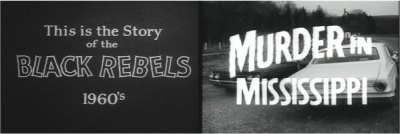
Finding examples that speak to a contemporary audience, however, is another issue completely. For their second release in January, Something Weird has dug deep into its vault of rarities and come up with a pretty peculiar pair of films. Black Rebels, originally entitled This Rebel Breed, is your standard race based JD delight, filled with potboiler plot elements, horrendous scenery chewing, a gratuitous elderly Mexican man, and almost every social ill known to society, from marijuana smoking to unwanted pregnancy. Then, for good measure, panicked producer William Rowland went and shot additional nudie footage, and haphazardly inserted it into his otherwise straightforward and sincere story. At least there is a post-production excuse for how odd this film is. Murder in Mississippi has no such after-shoot shenanigans to hang its storyline shame on. This unbelievably brutal look at civil rights workers, and the Southern sheriffs who saw nothing wrong with raping, murdering and otherwise undermining their effectiveness in getting blacks the right to vote, has to be seen to be disbelieved. It is quite possible that this is the most foul, fetid Something Weird title ever - and nothing remotely smutty occurs.
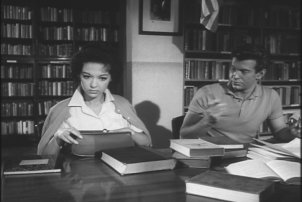 At first, Black Rebels is nothing more than West Side Story without the singing and dancing gangs. Certainly, the Ebonies, Caballeros and Royals run ramshackle across the screen, committing all manner of petty (theft) and major (drug running) crimes. Eventually, murder takes up residence in this respectable California burg, and it's up to the "youthful" looking cops of the local police department to go undercover and find out what all the hubbub is about. Turns out, the leader of the Royals, a bastard named Buck, hates just one race - the 'human'. As part of a plan to corner the pot market, he and his obese pusher pal devise a foolproof plan. They will get the Hispanics mad at the Blacks, and while they're having their half-assed Helter Skelter, the need for weed will skyrocket. So Buck does things like picking fights with the leader of the Caballeros, giving wacky-tobbacy to the leader of the Ebony's little brother, and harassing the pretty Mexican Miss Lola, who just so happens to be the non-gringo gang boss's sister. As our two pretend teens get more closely involved with the case, they discover that Buck is a heartless thug who thinks nothing of beating a buddy to death, and soon, everyone wants this bigoted butthead dead - none more so than the lovely Lola.
At first, Black Rebels is nothing more than West Side Story without the singing and dancing gangs. Certainly, the Ebonies, Caballeros and Royals run ramshackle across the screen, committing all manner of petty (theft) and major (drug running) crimes. Eventually, murder takes up residence in this respectable California burg, and it's up to the "youthful" looking cops of the local police department to go undercover and find out what all the hubbub is about. Turns out, the leader of the Royals, a bastard named Buck, hates just one race - the 'human'. As part of a plan to corner the pot market, he and his obese pusher pal devise a foolproof plan. They will get the Hispanics mad at the Blacks, and while they're having their half-assed Helter Skelter, the need for weed will skyrocket. So Buck does things like picking fights with the leader of the Caballeros, giving wacky-tobbacy to the leader of the Ebony's little brother, and harassing the pretty Mexican Miss Lola, who just so happens to be the non-gringo gang boss's sister. As our two pretend teens get more closely involved with the case, they discover that Buck is a heartless thug who thinks nothing of beating a buddy to death, and soon, everyone wants this bigoted butthead dead - none more so than the lovely Lola.
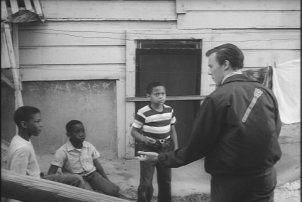 Sadly, such a minimal plot synopsis doesn't do Black Rebels justice. This erratic, electrifying film is so much fun, so filled with the kind of kinetic craziness that one comes to expect from the classic JD dynamic that you can't help but be won over by its wackiness. Nothing is out of bounds here. All manner of ethnic slurs and racial epithets make their way into the seemingly normal dialogue, as if to suggest how deeply the veins of injustice run. Skin color is not the only personal parameter under the microscope here. Class is part of the package (an incredibly nerdy rich kid, someone who makes Eddie Deezen seem muy macho, wants to join the Royals) and parents versus their progeny is also under exploration. This is the kind of film where teacher's read propaganda-like lectures to their students, then assign controversial topics for an in class debate, guaranteeing more pro/con grandstanding. Indeed, the collision between politics and the prurient, the need to see teens acting in a highly criminal manner, makes Black Rebels that much more engaging. Then add in the 21 Jump Street stuff, complete with a teen idol cop covered in about 16 tons of bronzer to give him that perfect mixed race ridiculousness and you've got a film that's gullible guilty pleasures are almost too many to mention.
Sadly, such a minimal plot synopsis doesn't do Black Rebels justice. This erratic, electrifying film is so much fun, so filled with the kind of kinetic craziness that one comes to expect from the classic JD dynamic that you can't help but be won over by its wackiness. Nothing is out of bounds here. All manner of ethnic slurs and racial epithets make their way into the seemingly normal dialogue, as if to suggest how deeply the veins of injustice run. Skin color is not the only personal parameter under the microscope here. Class is part of the package (an incredibly nerdy rich kid, someone who makes Eddie Deezen seem muy macho, wants to join the Royals) and parents versus their progeny is also under exploration. This is the kind of film where teacher's read propaganda-like lectures to their students, then assign controversial topics for an in class debate, guaranteeing more pro/con grandstanding. Indeed, the collision between politics and the prurient, the need to see teens acting in a highly criminal manner, makes Black Rebels that much more engaging. Then add in the 21 Jump Street stuff, complete with a teen idol cop covered in about 16 tons of bronzer to give him that perfect mixed race ridiculousness and you've got a film that's gullible guilty pleasures are almost too many to mention.
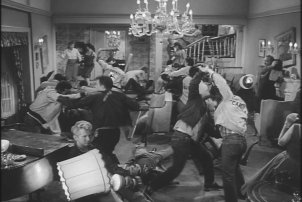 One that should have been done away with, though, is the unnecessary addition of some stunted skin flick footage. By all looks, the original movie (under the This Rebel Breed title) looked like every other Hollywood B picture, nicely noir and filled with backlot/location ambience. But the constant threat of race-based rioting was apparently not enough for producer William Rowland. So he grabbed the actor who played the Caucasian undercover cop, tried to emulate his rigid regulation haircut, and placed him into all manner of insipid sex scenes. No, our perplexed peace officer isn't "doing it" with the local lotharios and ladies of the evening. The actor would simply step into a doorway, look at the direction of the action with some manner of bewildered disbelief, and say his supposedly comic catchphrase - "excuse me." Thankfully, these stupid additions don't dominate Black Rebels, though they are wildly out of place. Some make absolutely no plot logic sense at all. Still, they don't detract from what's good here. All the acting is top notch, with special nods going to Rita Moreno (as the angry Latina Lola), a young Dyan Cannon as a gal with a scandalous secret, and Al Freeman, Jr. as the leader of the Ebonys. As a matter of fact, all the performances lift this film from merely delightful to absolutely demented. Had the proto-porn been cut, this would be one of the best infantile offender flicks ever. Instead, we get something great, goofed up by unnecessary smut.
One that should have been done away with, though, is the unnecessary addition of some stunted skin flick footage. By all looks, the original movie (under the This Rebel Breed title) looked like every other Hollywood B picture, nicely noir and filled with backlot/location ambience. But the constant threat of race-based rioting was apparently not enough for producer William Rowland. So he grabbed the actor who played the Caucasian undercover cop, tried to emulate his rigid regulation haircut, and placed him into all manner of insipid sex scenes. No, our perplexed peace officer isn't "doing it" with the local lotharios and ladies of the evening. The actor would simply step into a doorway, look at the direction of the action with some manner of bewildered disbelief, and say his supposedly comic catchphrase - "excuse me." Thankfully, these stupid additions don't dominate Black Rebels, though they are wildly out of place. Some make absolutely no plot logic sense at all. Still, they don't detract from what's good here. All the acting is top notch, with special nods going to Rita Moreno (as the angry Latina Lola), a young Dyan Cannon as a gal with a scandalous secret, and Al Freeman, Jr. as the leader of the Ebonys. As a matter of fact, all the performances lift this film from merely delightful to absolutely demented. Had the proto-porn been cut, this would be one of the best infantile offender flicks ever. Instead, we get something great, goofed up by unnecessary smut.
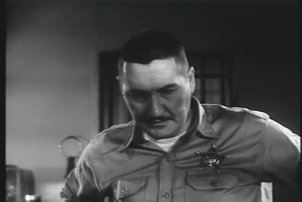 One fears for the same fate with Murder in Mississippi, especially when we learn that it's directed by the same mind that made the Olga canon (Yikes!). Oddly enough, this headline hyperbole, taken from the still smoldering (at the time) case of three civil rights workers who were murdered in 1964 is a fanciful farce that plays fast and loose with the facts, and mean and mesmerizing with its hatred. When a carload of Northern agitators hits the tiny town run by Sheriff Engstrom, they think they're in for a pretty uneventful stay. But the corrupt cop has other plans. Bringing them in on trumped-up charges, our jaundiced justice of the peace reads these no-good do-gooders the rural riot act. Get out of town, or there will be some of his Hell to pay. When they refuse, the bodies start piling up like cordwood. One boy is shot, while another is beaten and then strangled. While taking the corpses out to be buried, the sheriff's men decide to spare the life of a young lady. She promises that her famous actor sibling will pay $10K to get her out of trouble. But when the smooth talking thespian arrives, brother boy learns that this racially divided district is one shady rest stop. Backstabbing, castration and intimidation continue until the FBI steps in - not that it makes much difference inside this gangrenous good ole boy network.
One fears for the same fate with Murder in Mississippi, especially when we learn that it's directed by the same mind that made the Olga canon (Yikes!). Oddly enough, this headline hyperbole, taken from the still smoldering (at the time) case of three civil rights workers who were murdered in 1964 is a fanciful farce that plays fast and loose with the facts, and mean and mesmerizing with its hatred. When a carload of Northern agitators hits the tiny town run by Sheriff Engstrom, they think they're in for a pretty uneventful stay. But the corrupt cop has other plans. Bringing them in on trumped-up charges, our jaundiced justice of the peace reads these no-good do-gooders the rural riot act. Get out of town, or there will be some of his Hell to pay. When they refuse, the bodies start piling up like cordwood. One boy is shot, while another is beaten and then strangled. While taking the corpses out to be buried, the sheriff's men decide to spare the life of a young lady. She promises that her famous actor sibling will pay $10K to get her out of trouble. But when the smooth talking thespian arrives, brother boy learns that this racially divided district is one shady rest stop. Backstabbing, castration and intimidation continue until the FBI steps in - not that it makes much difference inside this gangrenous good ole boy network.
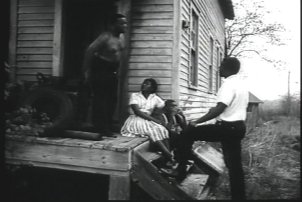 You've got to hand it to director Joseph P. Mawra. The same heavy, unsettling hand that helmed the brutally unblinking adventures of S&M queen Olga, instills the same level of unrelenting viciousness into this quasi-true story tastelessness. Hope is hidden under layers of lifelong backslapping (and stabbing) and justice is just a word bandied about during local lynchings. It is safe to say that no other racial exposé has the level of bleakness and bravado of this film. What other movie would flaunt its main characters cravenness so. Our sullied sheriff here is probably the cinema's most hissable villain ever, a vile man spewing out power-protracted epistles of bigotry as he bullies and beats the local populace into obeying his stance on segregation. Certainly, a film about this crime needs to be confrontational, but Murder in Mississippi wants to offend everyone. It paints the protestors as opportunists, or worse, uncaring rich kids with a bank account substituting for a sense of commitment (and backbone). The locals hate everyone, mocking Jews, Commies, and all New Yorkers with equal vitriol. The cornpone citizens are offset by a few poor blacks that are so skeptical of anyone helping them that they almost, backhandedly, support the stained system, and we even get organizers who'd rather copulate than find their missing assistants.
You've got to hand it to director Joseph P. Mawra. The same heavy, unsettling hand that helmed the brutally unblinking adventures of S&M queen Olga, instills the same level of unrelenting viciousness into this quasi-true story tastelessness. Hope is hidden under layers of lifelong backslapping (and stabbing) and justice is just a word bandied about during local lynchings. It is safe to say that no other racial exposé has the level of bleakness and bravado of this film. What other movie would flaunt its main characters cravenness so. Our sullied sheriff here is probably the cinema's most hissable villain ever, a vile man spewing out power-protracted epistles of bigotry as he bullies and beats the local populace into obeying his stance on segregation. Certainly, a film about this crime needs to be confrontational, but Murder in Mississippi wants to offend everyone. It paints the protestors as opportunists, or worse, uncaring rich kids with a bank account substituting for a sense of commitment (and backbone). The locals hate everyone, mocking Jews, Commies, and all New Yorkers with equal vitriol. The cornpone citizens are offset by a few poor blacks that are so skeptical of anyone helping them that they almost, backhandedly, support the stained system, and we even get organizers who'd rather copulate than find their missing assistants.
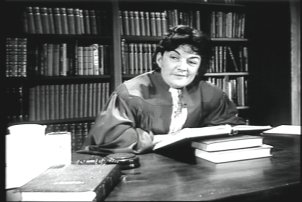 But that's not all. Murder in Mississippi is not through being odious and offensive. Rape is mentioned with regularity, our humbled heroine is assaulted six ways to Sunday, her savior has his penis cut off, and the Federal official who is supposed to be overseeing this entire case is in the pocket of the local lawman as well. Indeed, it is this last sequence, the chance for justice to prevail and crime to be punished, that is the most maddening of the entire movie. As our acerbic old coot of a commissioner sits in "judgment" over the facts of the case, she argues with the lawyers, badgers the witnesses, disallows testimony and, more or less, does a pretty damn good impression of a female Judge Roy Bean (she's about as attractive as a dead man from the Old West, too). Her bitch witch wickedness, meant to reinforce the notion that a certain level of lethal dishonesty runs throughout the entire country, adds fuel to our already fuming fire against such discrimination and graft. Yet Murder in Mississippi seems to suggest that fraud is the name of the game and nothing is really going to challenge or change that anytime soon. Even the last minute montage featuring a growing crowd heading off to register and vote, national protests, and the President Johnson discussing the Civil Rights Act can't cure this painful cinematic scar. We demand blood vengeance, not bureaucratic bullspit. Such an aggravating anti-climax only makes Murder in Mississippi that much more infuriating - and unforgettable.
But that's not all. Murder in Mississippi is not through being odious and offensive. Rape is mentioned with regularity, our humbled heroine is assaulted six ways to Sunday, her savior has his penis cut off, and the Federal official who is supposed to be overseeing this entire case is in the pocket of the local lawman as well. Indeed, it is this last sequence, the chance for justice to prevail and crime to be punished, that is the most maddening of the entire movie. As our acerbic old coot of a commissioner sits in "judgment" over the facts of the case, she argues with the lawyers, badgers the witnesses, disallows testimony and, more or less, does a pretty damn good impression of a female Judge Roy Bean (she's about as attractive as a dead man from the Old West, too). Her bitch witch wickedness, meant to reinforce the notion that a certain level of lethal dishonesty runs throughout the entire country, adds fuel to our already fuming fire against such discrimination and graft. Yet Murder in Mississippi seems to suggest that fraud is the name of the game and nothing is really going to challenge or change that anytime soon. Even the last minute montage featuring a growing crowd heading off to register and vote, national protests, and the President Johnson discussing the Civil Rights Act can't cure this painful cinematic scar. We demand blood vengeance, not bureaucratic bullspit. Such an aggravating anti-climax only makes Murder in Mississippi that much more infuriating - and unforgettable.
Taken together, or separately, it's really hard to call either film a perfect example of exploitation. Sure, there is some minor skin for titillation (or in the case of Murder in Mississippi, the promise of same) and an overall tone of something sleazy and unseemly. But both films have distinct and direct points they want to make, and unlike other offerings of their ilk, don't muck it up with fake fornication and siliconed skin sacks. The baffling bare bodkin in Black Rebels can't corrupt its overripe narrative filled with hatred, hemp and hollow hip-ness, and with all the sledgehammer histrionics in Murder in Mississippi, there's no time for unclothed tomfoolery. What they lack in lewdness, however, they more than make up for in social relevancy and inhuman levels of hatred. In the characters of Buck and Sheriff Engstrom, the white race has its humbling humiliation. Both of these dopes are so despicable, so completely incapable of anything remotely resembling human emotion that they're like racist robots, programmed to be prejudiced. Only Rebels makes a case for the sainthood of their subject matter. Murder argues that all individuals are flawed. However, in its surreal scenario, this type of person tends to act out in distinctly homicidal fashion. Though they may not be the most even handed movies made about racial intolerance, both Black Rebels and Murder in Mississippi pack quite a weird wallop.
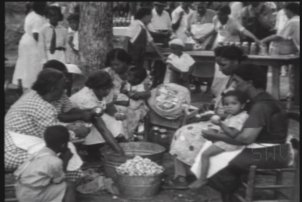 Something Weird usually soars in the monochrome arena, although recently their output has been sort of scattershot at best. In at least one case, however, the black and white 1.33:1 full frame presentation is dynamite. Black Rebels is a stunning study in contrasting concepts - love and hate, shadow and light. There is a real attempt to make something artistic and moody here, and the near pristine transfer helps said strategies. Murder in Mississippi, on the other hand, is a dark, dire mess. There are lots of defects and scratches present, emulsion destruction is visible, and several of the night scenes are so gloomy and dim that you can't see the action. The Dolby Digital Mono makes the jazzy, jerky soundtracks resonate with real hep daddy dandiness, and the collection of racially tense trailers is excellent. The only true bonus feature offered is a horribly insensitive look at The Negro Farmer, a US Government film discussing the poor people of the South, and how crop rotation, canning and community sorghum sharing will lead to financial soundness. If it weren't so sickeningly true you'd be laughing at the Third World wasteland the short portrays. Along with the standard SWV gallery of Drive-In Exploitation Art with audio rarities, this is one intense presentation.
Something Weird usually soars in the monochrome arena, although recently their output has been sort of scattershot at best. In at least one case, however, the black and white 1.33:1 full frame presentation is dynamite. Black Rebels is a stunning study in contrasting concepts - love and hate, shadow and light. There is a real attempt to make something artistic and moody here, and the near pristine transfer helps said strategies. Murder in Mississippi, on the other hand, is a dark, dire mess. There are lots of defects and scratches present, emulsion destruction is visible, and several of the night scenes are so gloomy and dim that you can't see the action. The Dolby Digital Mono makes the jazzy, jerky soundtracks resonate with real hep daddy dandiness, and the collection of racially tense trailers is excellent. The only true bonus feature offered is a horribly insensitive look at The Negro Farmer, a US Government film discussing the poor people of the South, and how crop rotation, canning and community sorghum sharing will lead to financial soundness. If it weren't so sickeningly true you'd be laughing at the Third World wasteland the short portrays. Along with the standard SWV gallery of Drive-In Exploitation Art with audio rarities, this is one intense presentation.
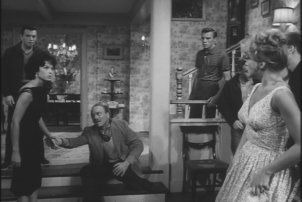 As a matter of fact, these films will definitely function as a likeability litmus test for the entire grindhouse experience. More than just tits, ass and screwing, exploitation producers mined any subject that the studios found too fiery to feature. Sure, racism reared its Tinsel Town head during the decades following WWII, but not with the kind of ferocious force of Black Rebels and Murder in Mississippi. In each film, loathing is handled with a decidedly leaden level of believability, and interracial romance is bravely displayed (Yes, Virginia, there really were laws against "the mixing of ethnicities" all throughout the South). Individuals anxious for a little more adult action in their exploitation experience will probably flee in fear once they see that the black on white wantonness here is more or less left to the imagination. But the braver of the bunch should stick around and, perhaps, learn a little something about the disgraceful segregation that ruled the country for centuries. Though they won't be mistaken for wholly honest history lessons anytime soon, this sensational double feature from Something Weird is a reminder of how far our country has come in four decades - and how much further is actually needs to go. Can't say that about the nudist camp films, can you?
As a matter of fact, these films will definitely function as a likeability litmus test for the entire grindhouse experience. More than just tits, ass and screwing, exploitation producers mined any subject that the studios found too fiery to feature. Sure, racism reared its Tinsel Town head during the decades following WWII, but not with the kind of ferocious force of Black Rebels and Murder in Mississippi. In each film, loathing is handled with a decidedly leaden level of believability, and interracial romance is bravely displayed (Yes, Virginia, there really were laws against "the mixing of ethnicities" all throughout the South). Individuals anxious for a little more adult action in their exploitation experience will probably flee in fear once they see that the black on white wantonness here is more or less left to the imagination. But the braver of the bunch should stick around and, perhaps, learn a little something about the disgraceful segregation that ruled the country for centuries. Though they won't be mistaken for wholly honest history lessons anytime soon, this sensational double feature from Something Weird is a reminder of how far our country has come in four decades - and how much further is actually needs to go. Can't say that about the nudist camp films, can you?
Want more Gibron Goodness? Come to Bill's TINSEL TORN REBORN Blog (Updated Frequently) and Enjoy! Click Here
|
| Popular Reviews |
| Sponsored Links |
|
|
| Sponsored Links |
|
|
| Release List | Reviews | Shop | Newsletter | Forum | DVD Giveaways | Blu-Ray | Advertise |
|
Copyright 2024 DVDTalk.com All Rights Reserved. Legal Info, Privacy Policy, Terms of Use,
Manage Preferences,
Your Privacy Choices | |||||||














